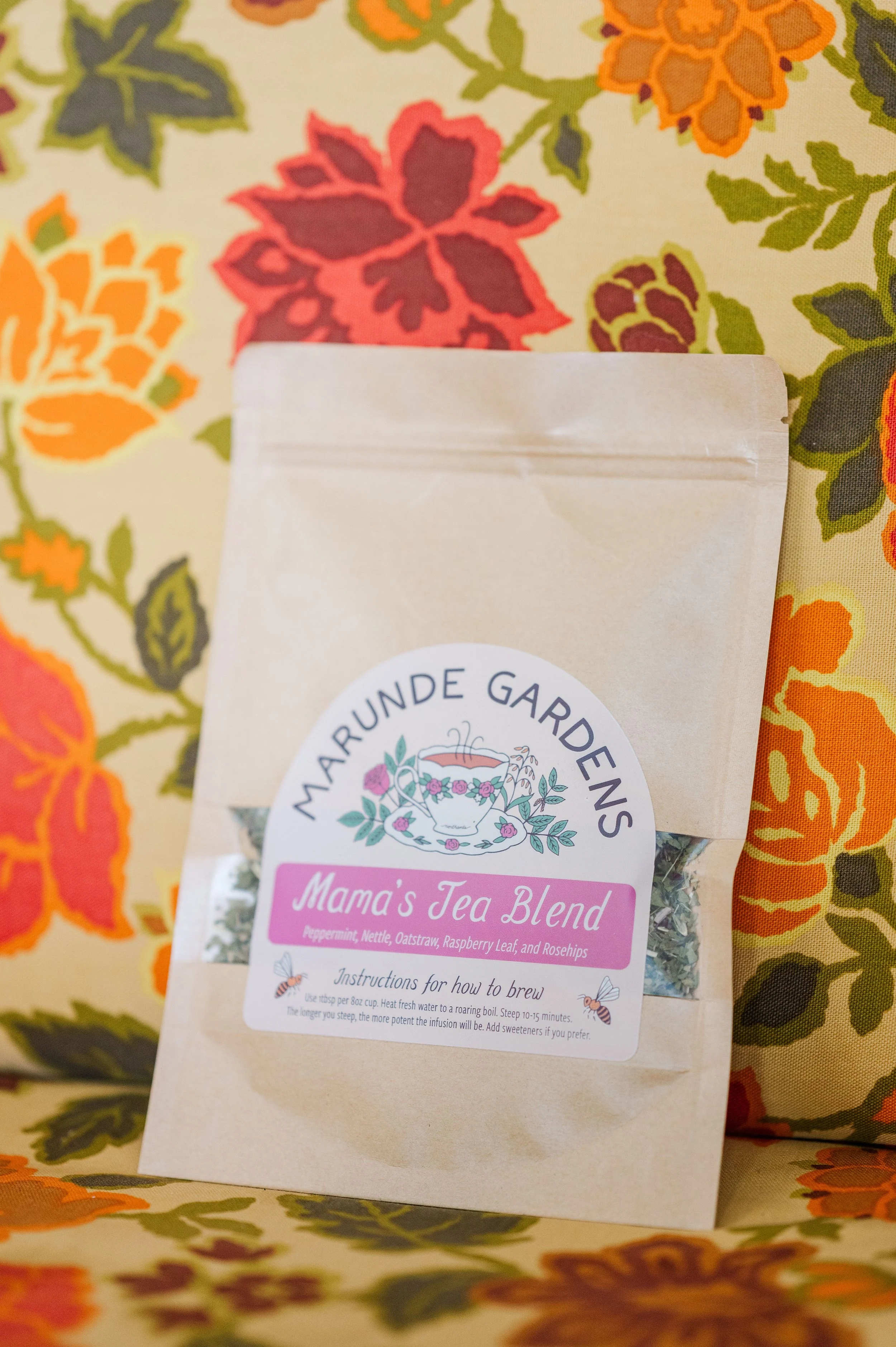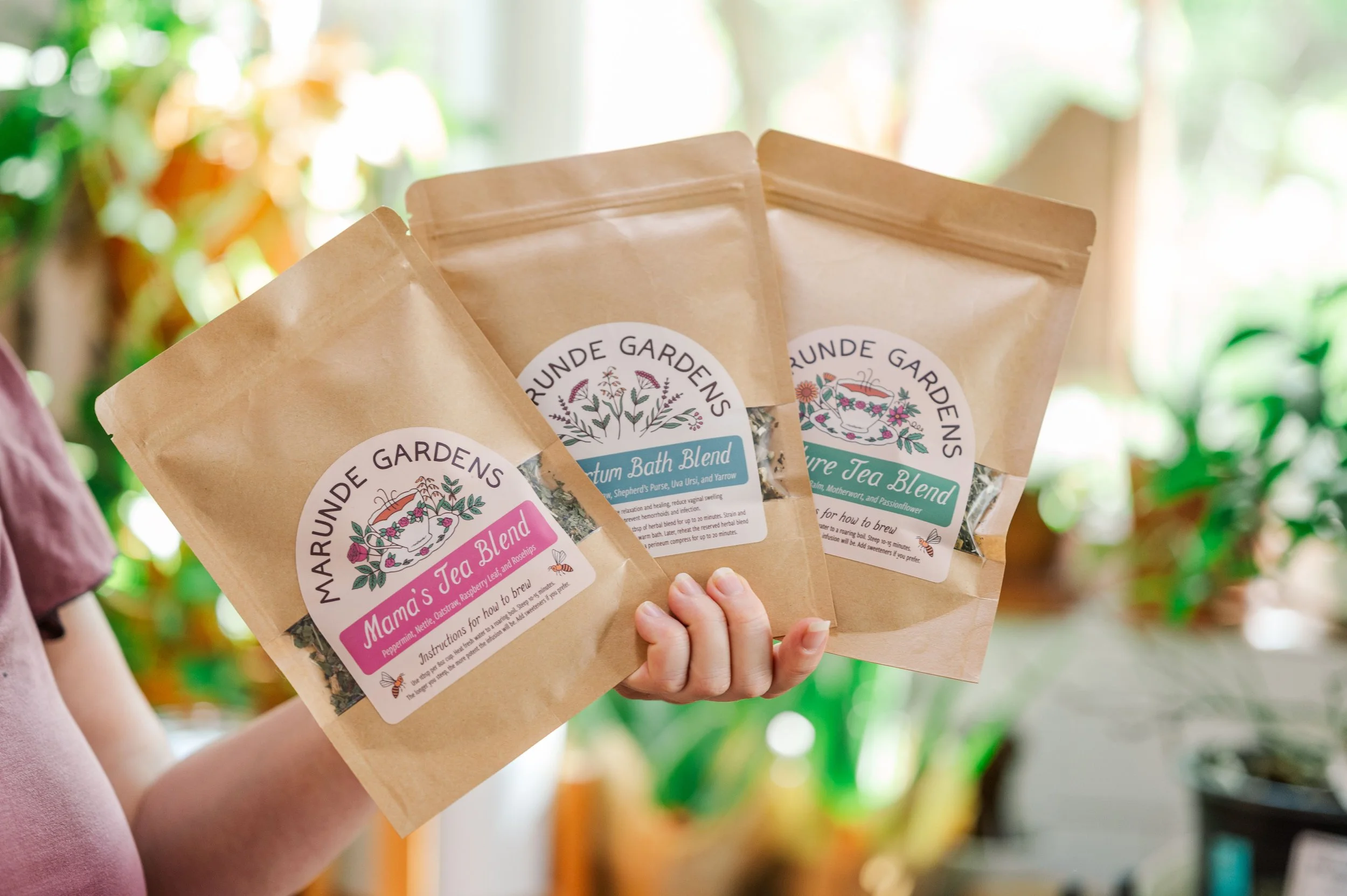 Image 1 of 2
Image 1 of 2

 Image 2 of 2
Image 2 of 2



Mama's Tea Blend
Peppermint, nettle, oatstraw, raspberry leaf, and rosehips
Peppermint (Mentha x piperita) is rich in menthol, making it the queen of digestion.
Stinging nettle (Urtica dioica) is abundant in fiber, minerals, vitamins, and antioxidant compounds like polyphenols and carotenoids. Nettle leaf supports milk supply, strengthens and tones the uterus, provides nutrients for pregnant folks, and can help women approaching menopause by acting as a restorative for hormonal shifts in the body.
Oatstraw (Avena sativa) is a gentle and calming herb that’s incredibly mineral and nutrient-rich. The effects of stress on the central nervous system (CNS) have been studied for over 50 years. Any intrinsic or extrinsic stimulus that evokes a biological response is known as stress, like feelings and sensations. The intensity and duration of stress impact the effect on the CNS. Chronic stress can actually cause structural changes in the brain that can have implications for memory and cognition. Enter oatstraw. What’s wonderful about this restorative herb, is that it’s absolutely safe to take long-term, even for pregnant and nursing folks who might also benefit from hormonal balance.
As a uterine tonic, raspberry leaf (Rubus idaeus) helps tone the uterus, promoting smoother menstrual flow and reducing the discomfort of cramps. Raspberry leaf is generally regarded as safe in moderation during the second and third trimesters, and may help to strengthen the uterus to prepare for labor; however, it is crucial to consult with your healthcare provider before use and avoid it in the first trimester.
A pinch of rosehips (Rosa rubiginosa & R. canina) is used to balance the flavor profile by adding a tart, tangy, and slightly floral base. Rosehips are also rich in vitamin C and provide antioxidant and anti-inflammatory support for overall well-being, which can also help with premenstrual symptoms. As always, consult with your healthcare provider before use.
Use 1tbsp per 8oz. cup. Heat fresh water to a roaring boil, then allow it to cool slightly before pouring over the tea. Steep 10-15 minutes. The longer you steep, the more potent the infusion will be. Add sweeteners if you prefer.
Peppermint, nettle, oatstraw, raspberry leaf, and rosehips
Peppermint (Mentha x piperita) is rich in menthol, making it the queen of digestion.
Stinging nettle (Urtica dioica) is abundant in fiber, minerals, vitamins, and antioxidant compounds like polyphenols and carotenoids. Nettle leaf supports milk supply, strengthens and tones the uterus, provides nutrients for pregnant folks, and can help women approaching menopause by acting as a restorative for hormonal shifts in the body.
Oatstraw (Avena sativa) is a gentle and calming herb that’s incredibly mineral and nutrient-rich. The effects of stress on the central nervous system (CNS) have been studied for over 50 years. Any intrinsic or extrinsic stimulus that evokes a biological response is known as stress, like feelings and sensations. The intensity and duration of stress impact the effect on the CNS. Chronic stress can actually cause structural changes in the brain that can have implications for memory and cognition. Enter oatstraw. What’s wonderful about this restorative herb, is that it’s absolutely safe to take long-term, even for pregnant and nursing folks who might also benefit from hormonal balance.
As a uterine tonic, raspberry leaf (Rubus idaeus) helps tone the uterus, promoting smoother menstrual flow and reducing the discomfort of cramps. Raspberry leaf is generally regarded as safe in moderation during the second and third trimesters, and may help to strengthen the uterus to prepare for labor; however, it is crucial to consult with your healthcare provider before use and avoid it in the first trimester.
A pinch of rosehips (Rosa rubiginosa & R. canina) is used to balance the flavor profile by adding a tart, tangy, and slightly floral base. Rosehips are also rich in vitamin C and provide antioxidant and anti-inflammatory support for overall well-being, which can also help with premenstrual symptoms. As always, consult with your healthcare provider before use.
Use 1tbsp per 8oz. cup. Heat fresh water to a roaring boil, then allow it to cool slightly before pouring over the tea. Steep 10-15 minutes. The longer you steep, the more potent the infusion will be. Add sweeteners if you prefer.
